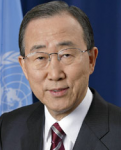In his report on the 'Work of the Organization,' UN Secretary-General Ban Ki-moon expresses optimism that “we will soon arrive at a new vision for sustainable development, new directions for the maintenance of peace and security, a renewed embrace of human rights, and a stronger United Nations to help bring our goals to life.” He calls on all countries to submit ambitious national contributions that detail how they will address climate change in the post-2020 period.
 August 2015: In his report on the ‘Work of the Organization,’ UN Secretary-General Ban Ki-moon expresses optimism that “we will soon arrive at a new vision for sustainable development, new directions for the maintenance of peace and security, a renewed embrace of human rights, and a stronger United Nations to help bring our goals to life.” He calls on all countries to submit ambitious national contributions that detail how they will address climate change in the post-2020 period.
August 2015: In his report on the ‘Work of the Organization,’ UN Secretary-General Ban Ki-moon expresses optimism that “we will soon arrive at a new vision for sustainable development, new directions for the maintenance of peace and security, a renewed embrace of human rights, and a stronger United Nations to help bring our goals to life.” He calls on all countries to submit ambitious national contributions that detail how they will address climate change in the post-2020 period.
The report to the UN General Assembly’s 70th session (UNGA 70) discusses, inter alia: the promotion of sustained economic growth and sustainable development; the maintenance of international peace and security; development in Africa; the promotion and protection of human rights; the effective coordination of humanitarian assistance efforts; the promotion of justice and international law; and strengthening of the UN.
The report notes “enormous progress” on the Millennium Development Goals (MDGs), noting that the global extreme poverty rate has been halved and continues to decline, “more children than ever” are attending primary school, child deaths have dropped dramatically, about 2.6 billion people gained access to an improved drinking water source, and targeted investments in fighting malaria, HIV/AIDS and tuberculosis have saved millions. It also highlights “significant gaps” that remain, including improving maternal and reproductive health, achieving gender equality, achieving full and productive employment especially for women and youth, stemming the global rate of deforestation, and accelerating progress “across the board” in Least Developed Countries (LDCs).
The report characterizes the elaboration of the post-2015 development agenda as the most inclusive and “bottom-up” of processes, involving unprecedented numbers of stakeholders, and welcomes the willingness of Member States to try new ideas and approaches, including “the new way of working, with small groups of Member States sharing seats” used by the Open Working Group (OWG) on Sustainable Development Goals (SDGs).
On post-2015 implementation, the UN Secretary-General calls for: considerable effort and investment to build a solid data and information and communications technology infrastructure; renewed efforts by all Governments to strengthen public institutions by enhancing their responsiveness and accountability in order to meet growing demands on service delivery, as set forth in the SDGs and targets; innovating and developing effective, accountable, participatory and transparent institutions at all levels, to ensure efficient and effective use of public resources for the services and benefits of all citizens, particularly women, girls and marginalized groups; and finding new ways to mobilize and allocate financial resources and other means of implementation such as information and communications technologies (ICTs) more effectively.
On strengthening the Organization, the report outlines that the UNGA made “important strides” in the past year to enhance the UN’s decision-making capabilities and to make it more reflective of the 21st century. It adds that the UNGA placed a new emphasis on coordination among the principal organs on topical issues, and prioritized enhanced interaction with civil society. It reports that the implementation of the International Public Sector Accounting Standards in 2014 strengthened accountability by making available more detailed information about the UN’s financial position and the use of its resources, which has led to greater traceability of management decisions. The report also states that there was a 21% rise in the frequency of UN Security Council meetings and a 36% increase in the number of UNGA meetings, and the Secretariat provided “quantitatively more but qualitatively consistent” support.
The report outlines the importance of partnerships, noting that during the Climate Summit of 23 September 2014, public and private sector leaders pledged to mobilize over US$200 billion in climate finance by the end of 2015 to finance low-carbon, climate-resilient growth.
Finally, according to the report, the Secretary-General no longer wishes UN Member States to consider the proposals on establishing a partnership facility, which had been made in the context of the proposed programme budget for the biennium 2014-2015. This would allow: for further consideration of how best to achieve the objectives for which a partnership facility had been proposed; and for any subsequent proposals to be informed both by the discussions held in the context of the consideration of the proposed partnership facility, and by Member States’ decisions on financing for development and the post-2015 development framework. [Publication: Report of the Secretary-General on the Work of the Organization]